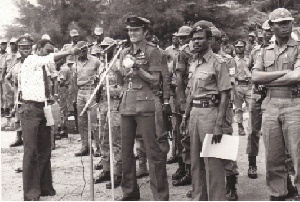The June 4
On June 4, 1979, young military officers and other ranks led by Flt Lt. Jerry John Rawlings undertook an Uprising (a mass revolt by junior officers and men of the Ghana Armed Forces) against the Military Regime, the Supreme Military Council (SMC).
The June 4 Uprising was borne out of a combination of corruption, bad governance, lack of discipline and impunity by leaders, mass frustration and suffering within the Ghana army, the forces, and the general public.
The Armed Forces Revolution Council (AFRC) government attempted to clean the fast decaying political system and the society. The primary objective was to "clean house" that is, to uproot the moral decadence that bedevilled the governance architecture, culture, and consciousness of the leaders of the country in all spheres of national administration. And it was also to instil the principles of Probity, Accountability, Integrity, Discipline, and Social Justice in the governance psyche, and in the conscience of the general public so as to restore a sense of moral responsibility in public life.
In addition, for the first time in the political history of Ghana, the general public became aware of the need to call their past rulers to account for their stewardship, and to be conscious in the collective ownership of the future of Ghana. The June 4 Uprising and the AFRC lasted for three months and restored Ghana to participatory democracy.
Events That Led To June 4 Uprising
The Political Systems
After the overthrow of the Progress Party (PP) government, it was generally believed that, Ghana was no longer the pacesetter in Africa's search for workable political institutions and systems. The radical left and the conservative right had failed in transforming Ghana. In opposing Nkrumah's one- party state, Abrefa Busia allegedly argued that ‘socialist rule in Ghana had led to unemployment and poverty for many while party officials grew richer at the expense of the masses’. However, the NRC/SMC apparently acted in response to continuing pressure to find a solution to the country's economic dilemma being experienced under the PP government. Inflation was estimated to be as high as 300 percent at the time the PP government was ousted from office. There were shortages of basic commodities, cocoa production fell to half its 1964 peak, and corruption among government officials.
The Failed Economy
In 1977 and 1978, the Central Bureau of Statistics reported that 'the country experienced an economic crisis of unprecedented magnitude' (Ghana Economic Survey 1977-79). The Bureau listed the features of the economy as an 'enormous' increase in money supply; 'a wave of un-checked inflation ' rampant shortages of food; a 'critical foreign exchange situation, and an acute shortage of imported raw materials and essential parts' (Ghana Economic Survey 1977-79: 1-2).
In 1977, Ghana's inflation rate was officially stated as above 100 per cent and was described by the World Bank as the second highest in the World (IBRD 1979).
The food supply situation also worsened. By 1977, there were reports that there was famine in the North, which the government refused to acknowledge (Harrel-Bond 1978). In the face of this economic crisis, the government increasingly resorted to deficit financing. The budget deficit for 1977/78 amounted to about two billion cedis, almost equal to the total expenditure for the previous year (IBRD 1979)
The economic crisis threatened every politically important groups in the country. The elites as a whole were disenchanted because of the general breakdown of the essential commodities distribution system 'since their most important class distinction was their westernized consumption pattern' (Hettne 1980: 183).
Commercial interests were antagonized as government's policy restricting the sale of essential commodities to government designated supermarkets alienated the market women and small-scale business people whose economic activities depended on the distribution of consumer goods. The shortage of foreign exchange also meant that import licenses could not be approved and letters of credit could not be established by importers. These became a fertile ground for Kalabule (hoarding and over pricing of goods) which eventually led to mass agitations and demonstration by citizens.
The then President of the Ghana Manufacturers' Association summed up the sentiments of the business interests thus: 'not only are the promised commanding heights [ of the economy] fast receding from our horizons; they are no longer in view as we sink gradually under the weight of government policies' (quoted in Botchwey 1981).
Political Corruption And Kalabule
According to Le Vine, 'by the end of the 1960's Ghana had developed what we term a culture of political corruption. It had been a long time in the making, but then its outlines were unmistakable. Bribery, graft, nepotism, favouritism, and the like had become commonplace at all levels of officialdom; and what is more, much of the public had come to expect officials to conduct their business in a spirit of subterfuge, dishonesty, and mendacity on all sides' (Le Vine 1975: 12-13). However, under Acheampong’s regime “there were quantitative as well as qualitative jumps in the level of corruption to the point where it became a societal epidemic.”
In an accurate analysis, Oquaye presented the following manifestations of kalabule under Acheampong. “Ostentatious display of wealth and vanity, hitherto unknown, became rampant as wild parties and flamboyant out-doorings were held for newly-born babies, where mere friends or associates donated over a thousand cedis per person just to show off. As the rich young women exhibited their ill-gotten gains, and as young girls sold their bodies for whatever material benefits they could get therefrom on an amazing scale, the national morality sank to its lowest nemesis.
Men abused their offices and defrauded their employers in desperate attempts to satisfy the tastes of their women as a new craze of free-spending spread across the country. The few honest ones who refused to make money by fair or by foul suffered humiliations and women taunted them as being useless, senseless and dull. The situation so degenerated that some homes were broken as a result and wives packed away to seek their pleasures with richer, free-spending but fraudulent men” (Oquaye 1980)
Indiscipline In The Armed Forces
The ranks of military rulers are more relevant within the military as it is critical in maintaining order, discipline, and legitimacy. However, an interesting paradox of legitimacy was created when Commissioners of the National Redemption Council (NRC), were out-ranked by officers not in the government. One solution the regime adopted was to allow the Commissioners to promote themselves to more appropriate ranks, thereby out-ranking their previous military superiors. Which led to NRC becoming the Supreme Military Council (SMC) and thereby limiting the regime to a few senior ranks instead of a junta.
This approach however, resulted in military officers who see their former colleagues being promoted, or superior officers who are now out-ranked by the Commissioners alienated. As a result, gross indiscipline and open threats of coups d'etat became commonplace in the barracks thereby undermining the stability of the of the Armed Forces and the government. The civilian population also perceived the military commissioners' promotions as corrupt or at least self-aggrandisement. Ultimately, the support of the government was weakened in the eyes of both military and civilian groups.
The June 4 Response
The Uprising reverberated across the country. From the cities to hamlets, and among every class except the corrupt beneficiaries of the regime. Though the Uprising was led by junior military officers and men, the corruption was so endemic and devastating to the extent that, every age group from primary schools to the universities, industries, market women, workers, politicians of varying persuasions etc poured unto the streets in support and to demand accountability from past leaders. The masses demanded execution of past corrupt leaders with the slogan, “Let the blood flow” as a deterrent to future governments. The June 4 Uprising was seized from the military as civilians were visibly seen leading the call for accountability and justice.
It was a national call to duty.
Current democratic Events
After 40 years of the June 4 Uprising, the moral history and relevance of such significant event has been lost on the nation. The feeling and the perception that heralded the 1972 overthrow of the PP government is rife again after 27 years of participatory democracy. “The radical left and the conservative right had failed in transforming Ghana” In other words, the National Democratic Congress, NDC and New Patriotic Party, NPP have failed to transform Ghana.
Unprecedented corruption both real and perceived has raked every governance institution. The Judiciary, the Legislature, and the Executive arms of government is believed to have been bedevilled with corruption, impunity, and maladministration.
The principles of probity, accountability, integrity, discipline, and social justice that are critical to sustaining good governance and prosperity is seen to have been shunned by the two main political parties as it is believed to be at conflict with the personal values of the political players.
High unemployment among the youth, urban and rural poverty are on the increase, local industries continue to struggle and collapse whiles for many, party and government officoal are growing richer at the expense of the masses. Wanton destruction of the nation’s forests, river bodies, airspace by foreigners in connivance with party and government officials have assumed an alarming proportion. The deliberate assault of state institutions by appointing relatives and criminal elements to such institutions for parochial interests by politicians, the hijack of the airwaves by political elements, and the excessive monetization (moneycracy) of internal party democracy by the two major political parties has resulted in the general public feeling alienated from governance and decision making.
There is a growing tension among the youth and the masses, and a stealth hate and anger building against the political leaders of the country. And taking cognizance of the events in North and East Africa in recent years of mass revolt against governments, it is imperative that, the nation undertake a sober introspective reflection to protect the stability of the nation.
The theme, “Developing A National Character For Sustainable Good Governance" for the 40th Anniversary of the June 4, and the 3rd Revolutionary Lecture is therefore timely and appropriate. The youth in particular are encouraged to participate in this year’s lecture so as to acquaint themselves with Ghana's political history, the relevance of June 4 in the 21st democratic dispensation and to create awareness for the way forward for Ghana's political system.
The writer is a Policy and Governance Analyst, member of the June 4 Central Planning Committee, and Chairman for Event & Planning Committee
Opinions of Tuesday, 28 May 2019
Columnist: Kofi B. Kukubor
June 4 uprising: A Call to developing a national character for sustainable good governance
Entertainment














